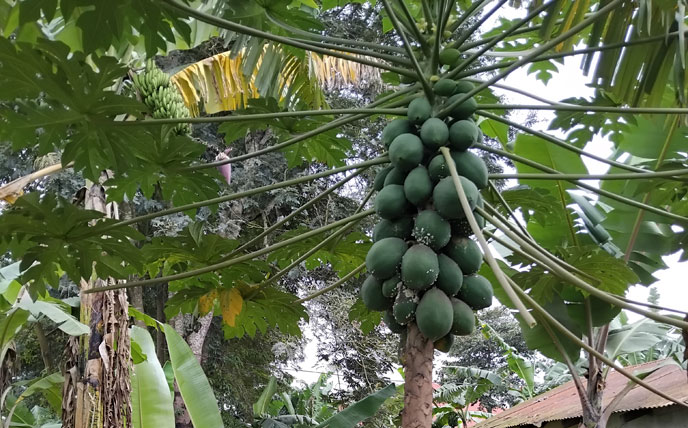How to control papaya mealybug


Pawpaw, also known as papaya (Carica papaya) is a popular fruit in Uganda known for its abundant supply of vitamins, dietary fibre and minerals.
It is mainly eaten fresh, and thus provides the much needed external enzymes such as papain and chymopapain that improve digestibility of food, especially proteins.
The fruit also has significant levels of anti-inflammatory and antioxidant properties with health benefits for consumers.
It is because of such advantages that the fruit has found several uses and is one of the most traded and consumed fruits in Uganda.
However the trade in live plant material including papaya fruits and seedlings, has accidentally accelerated the spread of papaya mealybug outside its native range.
This pest threatens food and nutrition security and adversely affects many countries including Uganda.
Papaya mealybug
Papaya mealybug is native to Central America but has spread rapidly to other regions of the world. It invaded East Africa between 2015 and 2020 and was detected in Uganda in 2021.
The pest has the potential to affect the production and quality of papaya and other economically important host crops and it can devastate a whole crop if left unmanaged.
The lack of safe trade and registered pesticides results in farmers using highly hazardous chemicals that are not only ineffective but can negatively impact native insect biodiversity such as pollinators and natural enemies of pests. A more ecologically sound approach to management is the use of biological control for many countries including Uganda.
This not only has a severe impact on the livelihoods of smallholder farmers but also on the ability to contribute to local, national and global food security.
Control
Typically, farmers manage papaya mealybug by relying heavily on highly hazardous pesticides.
However, only 70-90 percent of ground-applied pesticides reach their intended target, leaving the remainder to exert unintended consequences on insect biodiversity. This practice has led to detrimental effects on insect biodiversity, a worldwide decline in insect populations and the elimination of native pollinators and natural predators of pests.
Furthermore, the decline in insect diversity has disproportionately impacted smallholder farmers, particularly women, who rely on insect pollinators for their crop production.
As such scientists at the National Agricultural Research Laboratories (NaRL) Kawanda with partners from Centre for Agriculture and Biosciences International (CABI) have devised means of using natural enemies to manage out breaks of the pest in farmer fields. Seeds of Gold caught up with the experts during a sensitisation meeting of engaging farmers on how to adopt the technology and below are the details.
Biological control
The director of NaRL Dr Robooni Tumuhimbise explained that the project aims to provide solutions for sustainable management of papaya mealybug in Kenya, South Sudan and Uganda which includes biological control and the release of the parasitoid namely Acerophagus papayae, a wasp insect as part of the integrated pest management. This is a biological control which is an ecological friendly approach to control the pest population is the best method and he urged the farmers to adopt it rather than use chemicals which will kill are essential insects too.
Dr Caroline Nankinga the project investigator explains that an inception meeting, for all partners from Kenya, South Sudan and Uganda, officially launched the project in July 2022.
In Uganda farmers used to earn Shs6 million per season but now they can only fetch Shs1 million per season.
A participatory rapid rural appraisal has been conducted in Uganda to understand contextual issues related to papaya production and the impacts of papaya mealybug.
The district were farmer engagement had been on going include, Kayunga, Mukono and Luwero were already the parasitoids have been released.
There is ongoing sensitisation in the districts of Nakasongola, Kamuli, Masaka, Kasese and Nakaseke were release of the paraitids will be effected soon.
Farmer’s knowledge, perceptions and practices towards biological control were also assessed.
Seventeen focus group discussions and interviews took place among 333 papaya fruit growers in six sub-counties and findings were shared with 77 stakeholders from various institutions in Uganda.
Dr Nankinga and her team obtained the parasitoids from Kenya Agricultural and Livestock Research Organisation (KaLRO) which they have been rearing at NaRL.
Behavior of the mealybug
Mealybug is cotton like and it reproduces sexually with wingless females and the male ones develop between 27-30 days compared to females which take 24-26 days.
It feeds by sucking sap from plants including pawpaw and it often produces sticky honeydew which can cover the leaves leading to stunted growth. It also produces the dew on the fruits which makes it to rot.
It infests not only pawpaw but plants such as mangos, all vegetable varieties, pineapple, maize and cassava among others.
Rearing
At the rearing facility at NaRL, the scientists use Irish Potato which is left to sprout and the mealybugs are inoculated on the sprouted potato and they continue to feed on its leaves.
They are left to grow for two weeks and are exposed to the parasitoid which feed on the mealy burg by sucking fluids from it.
The parasitoid will then lay its eggs inside the mealybug and once the eggs grow into larvae, this will cause the mealy burg to die and the larvae are let out to enable them to grow into an adult insect. This way the parasitoids will multiply and the scientists take some to be released in farmer fields.
This process will continue in the paw farmers and by time the mealybugs die their number is reduced in the farms. Dr Nankinga explained that farmers in the districts where the parasitoids were released testified that the technology works because their pawpaw plants are now fruiting well.
The parasitoids keep moving in neighbouring districts in search of mealybugs and farmers have been advised to conserve them to avoid extinction and recurring of the mealy burg challenge.


0 Comments